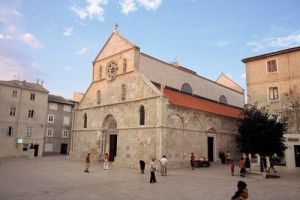Pag
Pag

Pag is a Croatian island and there are two towns on the island; Pag and Novalja and many smaller villages. Pag is famous for its ancient monuments, culinary delights and it has different nature with magically beautiful stone scenery.The Island of Pag is a rough, stone made, edged with sky-blue sea and placed under the wing of the Velebit Mountain. It is often called “Island of Rock ” or “Lunar Island”. Its surface has a somewhat intimidating appearance with a stone white from gale, rugged in so many forms that only nature can create.
The island of Pag is known as one of the sunniest islands in the Adriatic, with over 2,500 hours of sunshine per year and its coast is woven of even 270 km of pebbly beaches with crystal clear sea.
This island has many churches. Church of the Assumption of Mary which is in the center of the Town of Pag. It was built in the 15th century. Church of St. Francis is in the southern part of the Old Town core. Church and monastery next to the church were used by Conventual Franciscans. Monastery functioned until 1785 when it was officially abolished in 1795. There is also a Fortress tower Kamerlengo.
The most beautiful panoramic view of the very fabric of Pag offers a lookout Gradac placed on the road that connects Pag and Novalja and you will see the beautiful panorama.
Pag lace is the unique handicraft made by valuable and skilled hands of woman from Pag. It is believed that the Pag lace takes its origin from the city of Mycenae. In the town of Pag making lace began in the late 15th century for the church liturgical vestments. Making lace was initiated by the Benedictine convent that had a school of lace. Lace collection that Benedictine nuns kept and collected more than 150 years, the Ministry of Culture declared the Croatian cultural heritage. History remembers the time when women from Pag went to the court of Maria Theresa to make lace for her.
One of specialities is a lamb. Lamb has specific flavor because of the environment in which lives and feeds autochthonous Pag sheep Pramenka. A variety of medicinal plants grows on the karst, barren rocks: nightingale,sage, miserly, small grass strewed with salty wind, from frequent winter storm. Because of such breeding and dietary habits, lamb meat has a specific taste. We could say that the world gastronomes consider that is unforgettable delicacy of Pag table.
When you come on the island, in on last three days of carnival, you can see one dance, called-Paško kolo. Paško kolo is danced to the sounds of urban music. Kolo is performed on last three days of carnival on Sunday, Monday and Tuesday in the central town square.
Also famous is the Ornithological reserve Velo Blato (Big Mud) which is in the southern part of the island of Pag. It is the habitat of over 160 species of waterfowl, of which 66 species are nesting birds.
This island is connected to the mainland by a bridge.
Pag has a reputation as a party destination due to its bustling nightlife and there is a famous Zrce beach.
| Country | Kroatien |
|---|---|
| Languages spoken | Kroatisch |
| Currency used | EUR |
Sports & nature
Also famous is the Ornithological reserve Velo Blato (Big Mud) which is in the southern part of the island of Pag. It is the habitat of over 160 species of waterfowl, of which 66 species are nesting birds. The most beautiful panoramic view of the very fabric of Pag offers a lookout Gradac placed on the road that connects Pag and Novalja and you will see the beautiful panorama.
Nightlife info
Pag has a reputation as a party destination due to its bustling nightlife and there is a famous Zrce beach.
Culture and history info
This island has many churches. Church of the Assumption of Mary which is in the center of the Town of Pag. It was built in the 15th century. Church of St. Francis is in the southern part of the Old Town core. Church and monastery next to the church were used by Conventual Franciscans. Monastery functioned until 1785 when it was officially abolished in 1795. There is also a Fortress tower Kamerlengo. Pag lace is the unique handicraft made by valuable and skilled hands of woman from Pag. It is believed that the Pag lace takes its origin from the city of Mycenae. In the town of Pag making lace began in the late 15th century for the church liturgical vestments.
Unfortunately there are no hotels at this location at the moment.
Unfortunately there are no self-catering offers at this location at the moment.
Unfortunately there are no tour offers at this location at the moment.
Unfortunately there are no cruise offers at this location at the moment.
Unfortunately there are no car rental offers at this location at the moment.
Unfortunately there are no yacht rental offers at this location at the moment.
Unfortunately there are no jet rental offers at this location at the moment.
